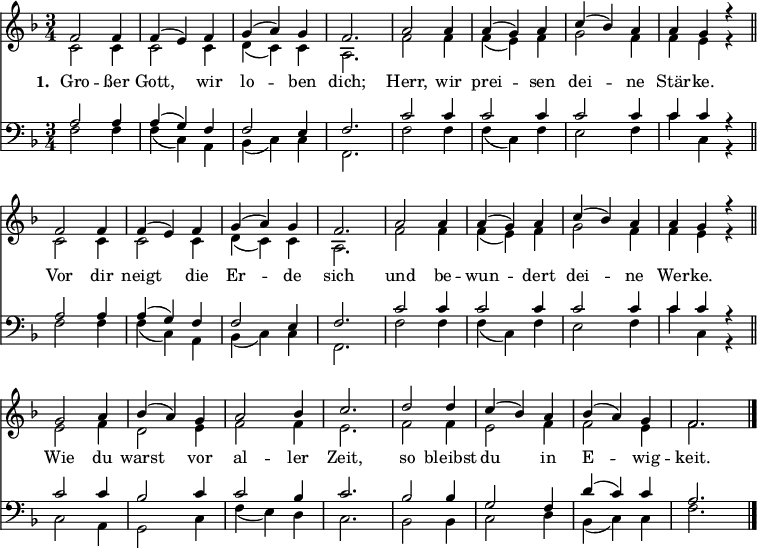Holy God, We Praise Thy Name

"Holy God, We Praise Thy Name" (original German: "Großer Gott, wir loben dich") is a Christian hymn.
The German Catholic priest Ignaz Franz wrote the original German lyrics in 1771 as a paraphrase of the Te Deum, a Christian hymn in Latin from the 4th century. It became an inherent part of major Christian ceremonial occasions, mainly as a conclusion song. Due to its memorable melody and theme it is one of the most popular hymns and prevalent in German-speaking communities.
As a result of the German emigration in the 19th century, the song became known in the United States and was translated to English by Clarence A. Walworth in 1858, except verse 7 (translated by Hugh T. Henry), which accounted for its wide spreading around the country.
History of the hymn
The first printing of the hymn was made in Vienna 1776, where it became part of the Catholic hymnal (Katholisches Gesangsbuch) upon the order of Her Apostolic Majesty Maria Theresia.[1] Since then, different varieties in the German lyrics were developed, of which two are still in use: Johann Gottfried Schicht's Allgemeines Choralbuch (1819) and Heinrich Bone's Cantate (Mainz 1852)
The lyrics paraphrase the Latin Te Deum. Its original version of 1771, which was later amended by Ignaz Franz, consisted of 12 verses; however, the amendment never gained acceptance and so the first version (altered by consolidating the 5th and 6th verse) persisted. The melody first appears in the Allgemeines Katholisches Gesangbuch (Vienna, c. 1774).[2] A typical setting of the hymn goes as follows:[3]

On the initiative of Johann Gottfried Schicht, the hymn also became part of Protestant hymnals, but was widely neglected for a long time due to its perceived status as a "spiritual folksong" in the Age of Enlightenment. Only in the 20th century was it fully accepted by Protestants, though shorter and altered versions are often sung (occasionally two verses were completely replaced by the New Apostolic Church).[4]
The hymn became also part of military hymnbooks where it was considered as a song of thanksgiving. The military hymnal of the Evangelical Church of 1939 added a conclusion verse which praised the Führer Adolf Hitler. The hymnal of the so-called "German Christians" (1941) was named after the song and contained a version which was "purified of Jewish elements" and adjusted to the Nazi ideology.[5]
The content of the song can be divided into three parts: a hymnic part about God the Father (verses 1-4 in the English version, 1-5 in the German), a similar one about God the Son (verses 5-7 in English, 6-8 in German), and a series of petitions (verse 8 in English, 9-11 in German).
In the region of Upper Silesia in Poland, this hymn is performed in loose Polish translation ("Ciebie, Boże wielbimy"), replacing "Ciebie Boga wysławiamy" by Franciszek Wesołowski which is officially sanctioned as a Polish version of Te Deum (so called "Millenial Te Deum") by Polish Episcopal Conference, and widespread in other regions of the country. It is usually performed in 4/4 metre instead of traditional 3/4 tempus perfectum.
Text
| Original German text[6] | English translation |
|---|---|
1. Großer Gott, wir loben dich, |
1. Holy God, we praise Thy Name; |
In Switzerland there also exists a pacifistic version which was composed after World War I by Karl von Greyerz and is destined for the Swiss Day of Repentance and Prayer, an interdenominational church holiday in Switzerland.
References
- ^ (German) Katholisches Gesangbuch, auf allerhöchsten Befehl Ihrer k. k. apostolischen Majestät Marien Theresiens zum Druck befördert (Verlag der Katechetischen Bibliothek, Wien 1776)
- ^ "Tune: GROSSER GOTT (11171)". Hymnary.org.
- ^ The Worshipbook: Services and Hymns. Philadelphia: The Westminster Press. 1972. p. 420.
- ^ apwiki.de – Großer Gott, wir loben dich (German) lyrics version of the New Apostolic Church
- ^ Vgl. Michael Fischer, Großer Gott wir loben dich. (PDF; 2,5 MB) (German) detailed comments about the history of the hymn (February 2006 / July 2007), page 13-17: Te deum and its German version under Nazi and militaristic influence
- ^ Only the stanzas corresponding to the English translation are shown. The original has, as indicated, 11 stanzas.
- ^ There exist several variants for the last stanza.
External links
- All verses; short facts about the history, cyberhymnal.org
- Holy God, We Praise Thy Name, performed by Irish Philharmonic Chorus (1996) youtube.com
- Großer Gott, wir loben dich, conclusion of the Papal Mass in Munich (2006) youtube.com
- (German) Detailed description about the history of the song and different versions, lyrik-und-lied.de
- (German) Information from Liederdatenbank
- Holy God, We Praise Thy Name (mp3 with organ only)
